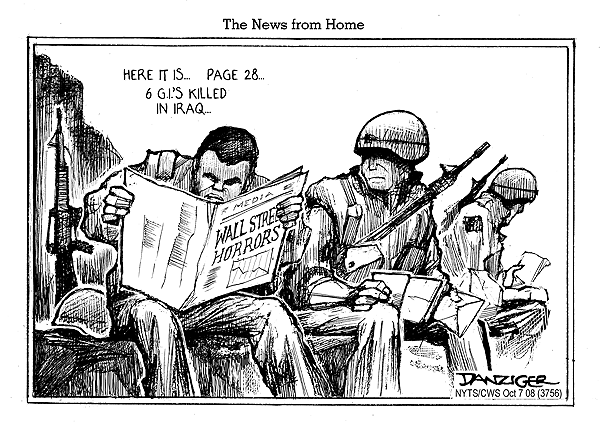Saturday, October 25, 2008
NYT: Bomber Kills 11 in Attack on Iraqi Official


Iraqis removed debris on Thursday in Baghdad after a car bomber struck the convoy of the minister of labor and social affairs.
Bomber Kills 11 in Attack on Iraqi Official
BAGHDAD — A suicide car bomber drove into a government minister's convoy in the Baghdad morning rush hour on Thursday, killing 11 people and wounding 22, according to Iraqi government and hospital officials.
According to the Ministry of Labor and Social Affairs, the attack left its chief, a Shiite, unhurt but killed his nephew, who was in the minister's security detail. The dead included a total of four bodyguards and three police officers, according to a police officer at the scene. The blast left a 12-foot-wide crater and damaged dozens of the photography shops that the area where the attack took place, Tahrir Square, is known for.
The fuller casualty count was given by hospital officials, who spoke on condition of anonymity because they were not authorized to speak to reporters.
Reuters said one of its television camera operators saw a vehicle plow into a convoy of "six or seven" S.U.V.s near Tahrir Square in central Baghdad.
The bomber's vehicle, a white 1979 Toyota Land Cruiser filled with explosives, burst into flames, and chaos ensued as police officers and bodyguards opened fire and as other vehicles nearby crashed into each other or sped away.
The attack on the minister, Mahmoud Muhammad al-Radhi, was the second in four months against a member of the 40-person cabinet, underscoring the continued perils facing Iraqis despite a sharp reduction in overall violence.
Salam Rzoki, 35, was walking to work at a nearby photograph developing center and said he was about 100 yards away when the vehicle exploded.
"Iraqi security forces deployed around the scene and started shooting randomly to keep people away," Mr. Rzoki said. "I tried to cross the street to help the victims but a policeman told me to stay away. I explained that I just wanted to help the victims, and he refused me again, then pulled out his gun and fired a warning shot over my head."
A spokesman for the labor minister, Abdullah al-Lami, told Al Arabiya television that the bombing was "the latest in a series of criminal attacks that are targeting the development process in Iraq," The Associated Press reported.
Also on Thursday, American troops handed over control of Babil Province, a predominantly Shiite central province, to Iraqi forces.
Babil was once so filled with violence that the northern part of it was dubbed "the triangle of death" by United States forces. It is the 12th of Iraq's 18 provinces to be handed over to the control of Iraq's own security forces.
Lt. Gen. Lloyd Austin III, the second highest-ranking commander of American forces in Iraq, spoke at the transfer ceremony, calling the event a "milestone" in a province where militant attacks have dropped by more than 80 percent in the last year.
Anxieties over the transfer of power rose this week when, early on Tuesday morning, the departure of United States troops from Sakhreya, a disputed area between Babil Province and Anbar Province, prompted a firefight between rival factions of the Sunni al-Bouisa tribe, one supporting the United States and the other sympathetic to Al Qaeda in Mesopotamia, the domestic terrorist group that the American military says is led by foreigners.
Security officials in Diwaniya Province announced that a Wednesday night raid conducted by American and Iraqi special forces had succeeded in arresting two men near a cemetery in Najaf who they said were members of the so-called special groups, or Iranian-backed Shiite militias.
Three people suspected of being members of such groups were also arrested Thursday morning in Baghdad, the United States military said.
Militia members currently in custody have said that these groups receive training, funding and weapons from the Revolutionary Guard of Iran.

The attack took place in Tahrir Square, in Baghdad.